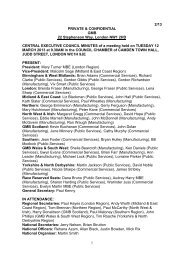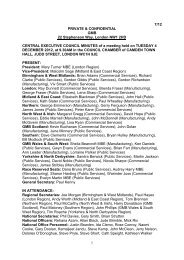WO toolkit 2012 complete.pdf - GMB
WO toolkit 2012 complete.pdf - GMB
WO toolkit 2012 complete.pdf - GMB
You also want an ePaper? Increase the reach of your titles
YUMPU automatically turns print PDFs into web optimized ePapers that Google loves.
SECTION 5.37<br />
37. How much notice do I get on redundancy and do I have to work it?<br />
The employer should give you at least the statutory notice of a week for each <strong>complete</strong> year of service,<br />
up to a maximum of 12 weeks.So someone employed for seven years gets seven weeks’notice.However<br />
you might well be entitled to longer notice under your contract of employment–a monthly paid<br />
worker should get at least one months’notice,even if they have been employed for less than four years.<br />
Be careful not to confuse warnings and consultation,with notice of dismissal.Notice only counts if it is<br />
clearly addressed to you and specifies the date you will finish work and your employment will end.If you<br />
leave because of a general warning that redundancies are coming,you may lose your redundancy pay.<br />
Similarly,when your employer does give you notice,you must wait for it to run its course.Do not leave<br />
your job as soon as you receive the notice of redundancy–you may lose your redundancy payment.<br />
If you want to leave before your notice expires e.g.to take up another job,you can ask your employer to<br />
agree an earlier termination date,on the basis that you will still get your redundancy payment.<br />
Alternatively,during the statutory notice period you can serve written counter-notice to leave early<br />
and if your employer does not object you can go(with your redundancy pay)when your counter-notice<br />
expires.However before your counter-notice ends your employer can object to it in writing,saying that<br />
if you leave early they will withhold your redundancy pay.You then have the option of leaving when your<br />
counter-notice ends and arguing in an Employment Tribunal that your employer’s objection was<br />
unreasonable and that you should get your redundancy pay–a risky strategy.<br />
Your employer may give you pay in lieu of notice,providing your contract allows for this.<br />
If you have two years’continuous service at the time your notice from your employer expires,you are<br />
entitled to a reasonable period of paid time off during working hours to look for a new job.<br />
An employer who proposes 20 or more redundancies within a period of 90 days or less should consult<br />
with the recognised union or(if there is none)with representatives elected by the workforce.<br />
Consultation should begin at least 30 days before the first redundancy takes effect.Where the<br />
proposal is for 100 or more redundancies,consultation should begin at least 90 days before the first<br />
one is due to take effect.<br />
REMEMBER: there may be more than one person affected by this issue.<br />
Consider calling a meeting to advise,recruit and organise.

















